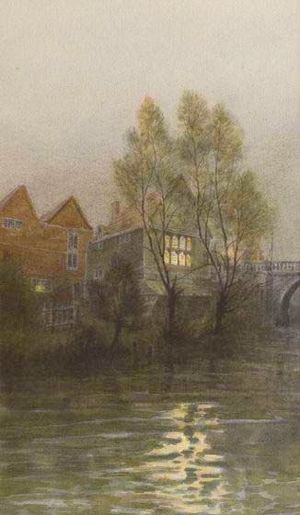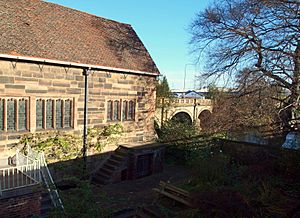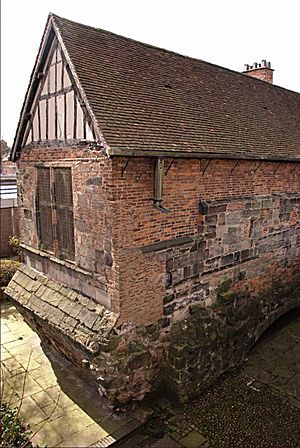St Mary's Bridge Chapel facts for kids
St Mary's Bridge Chapel is a special old building in Derby, England. It's a Church of England chapel. What makes it unique is that it's a bridge chapel. This means it was built right on a bridge! There are only a few of these medieval chapels left in England. It's considered a Grade I listed building, which means it's very important historically and architecturally.

The Chapel of St Mary on the Bridge, often called the Bridge Chapel, was built on the first arch of a very old bridge. This bridge crossed the River Derwent. You can still see parts of the old bridge's arch under the chapel's east wall. Today, the chapel stands next to the newer St Mary's Bridge, which was built in the 1700s.
Contents
A Long History
We don't know the exact year the first bridge chapel was built. But historians think it was probably around the late 1200s or early 1300s. The chapel was originally made of stone. Over time, some parts were repaired with brick.
The south side of the chapel has a wooden gable at the top. Below it is a stone window from the 1400s with modern glass. Inside, the chapel is small and has one main room.
Different Uses Over Time
St Mary's Bridge Chapel is one of only six bridge chapels still standing in England. Over its long history, the building has been used for many different things. It was even used as a prison at one point! It also served as a carpenter's workshop.
In 1930, the chapel was restored and made beautiful again. This was done in memory of Alfred Seale Haslam, who used to be the Mayor of Derby. His family helped pay for the restoration.
Remembering Important People
On the north side of the chapel, there's a special stone tablet. It remembers three Catholic priests: Nicholas Garlick, Robert Ludlum, and Richard Simpson. They were remembered near this spot on July 24, 1588.
Who Uses the Chapel Today?
Even though the chapel is owned by the Church of England, it's also used by other Christian groups. These include Latvian and German-speaking Lutheran churches. Russian Orthodox church members also use the chapel for their services.
The bridge next to the chapel, St Mary's Bridge, was built between 1788 and 1793. It was designed by Thomas Harrison. This bridge is also a very important historical structure. The house next to the chapel, called Bridge Chapel House, is also a listed building.
See also
- Chantry Chapel of St Mary the Virgin, Wakefield
- Rotherham Bridge
- St Ives Bridge (Cambridgeshire)
 | James B. Knighten |
 | Azellia White |
 | Willa Brown |



